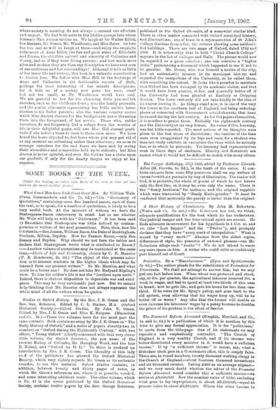Studies in Ossford History. By the Rev. J. R. Green
and the Rev. Geo. Roberson. Edited by C. L. Stainer, M.A. (Oxford Historical Society.)—Oxford Studies. By John R. Green. Edited by Mrs. J. R. Green and Miss K. Norgate. (Macmillan and Co. 5s.)—These two volumes have for the most part the same contents. Both contain an essay by Mr. J. R. Green on "The Early History of Oxford," and a series of papers (twenty-two in number) on "Oxford during the Eighteenth Century," with two others, "Young Oxford" (chiefly concerned with that very clever little volume, the Oxford Spectator, the pen name of the present Bishop of Colombo, Mr. Humphry Ward, and the late E. Nolan), and "Oxford As It Is." To these is prefixed an introduction by Mrs. J. R. Green. The liberality of this lady an d of the publishers has allowed the Oxford Historical Society, which very rightly regards Mr. Green as its authentic founder, to use this material. Oxford Studies contains, in addition, between twenty and thirty pages of notes, in which Mr. Green's references are, where it is possible, verified, and some interesting additions made. The other volume, which is No. 41 in the series published by the Oxford Historical Societe, contains twelve papers by the Rev. George Roberson,
published in the Oxford Ch,oniele, of a somewhat similai kind. There is other matter connestel with Oxford municipal history,. end illustrations ; one of them is-a representation of St John's College Gardens from a fan, the reverse showing some unidenti- fied buildings. There are two maps of Oxford, dated 1762 and MS. It is noteworthy that in both "Christ Church College" appears in the list of Colleges and Halls. The phrase would now be regarded as a gross solecism ; one can conceive a "higher critic" pronouncing a document which happened to use it not to be genuine. Mr. Green, who was himself a native of the city, had an enthusiastic interest in its municipal history, and , regarded the usurpations of the University, as he called them, with something like hatred. It looks like a paradox to maintain that Oxford has been damaged by its academic visitor, and that it would have been greater, richer, and generally better off if the University had been planted at Banbury or Chipping Norton. The town certainly did not take kindly to the idea of its visitor leaving it. As things stand now, it is one of the very few towns in the southern half of England, not being watering- places or connected with Government establishments, that have increased during the last century. As for the papers themselves, it is needless to praise them. Probably the eighteenth century saw the University at its very lowest. Its raison d'être, learning, was but little regarded. The most serious of its thoughts were given to the lost cause of Jacobitism ; the vanities of the time were even exaggerated by its fops and roues, for a student who does not study exhibits in caricature the vices which he actually has, or to which he pretends. Yet learning had representatives even in these days of darkness. Elmsle,y and Kennicott are names which it; would not be difficult to match with many others.






































 Previous page
Previous page